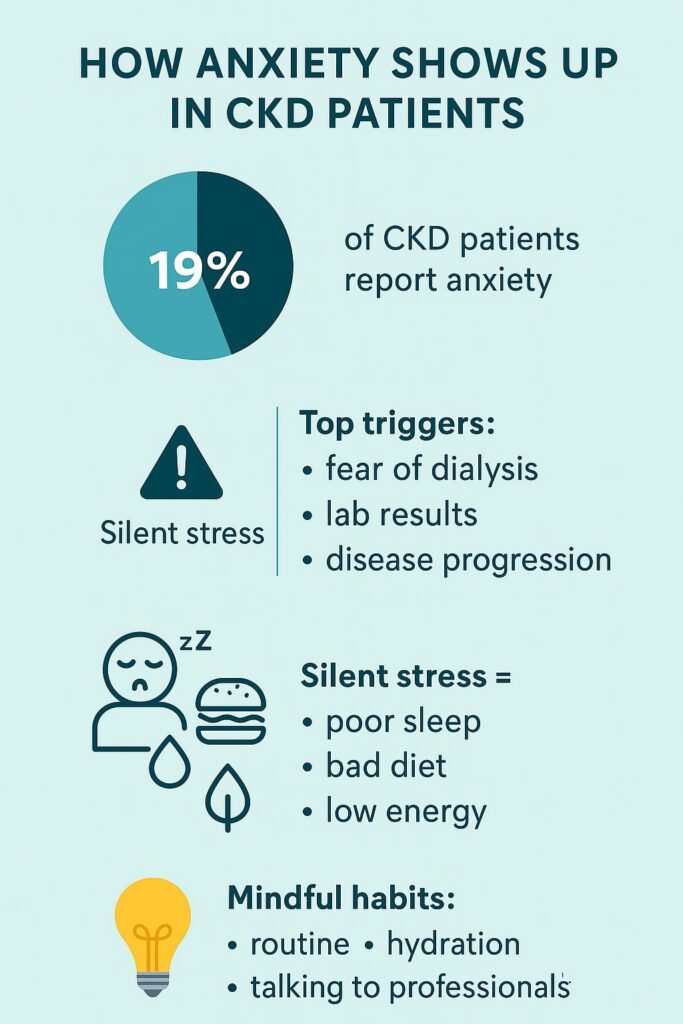
Introduction
Dialysis is a life-saving treatment for individuals with end-stage kidney disease. However, beyond its physical toll, dialysis can deeply impact mental health. Recognizing and addressing these effects is essential for comprehensive care.
Common Mental Health Challenges in Dialysis Patients
Depression: The Silent Weight Many Don’t See
Living with a chronic condition like kidney failure changes everything, from your daily routine to your self-worth. It’s no surprise that studies show nearly 50% of dialysis patients experience depression. But behind this number lies a deeper truth.
Depression often begins with a lack of awareness, is worsened by the fear of dialysis, and for many, hits hardest when transplant becomes the only remaining option.
I’ve lived through it all. Diagnosed at just 10 years old, I underwent a kidney transplant, but even that kidney was eventually rejected. I faced a sudden cardiac arrest, and by God’s grace, I was given another chance at life.
One life was given by birth, once again other by my mother, who donated her kidney when I was 19.
Now, after 8 years on dialysis, undergoing treatment three times a week, I’ve learned to balance my diet, stay physically and mentally active, and, most importantly, not let depression define me.
That’s exactly why I founded CareForKidney.com, to raise awareness, offer real hope, and inspire others to face their battles with strength, positivity, and a smile
Psychological distress, depression, and anxiety negatively impact the quality of life by NIH
Anxiety: The Fear That Follows You Silently

Anxiety affects nearly 19% of chronic kidney disease (CKD) patients, often triggered by uncertainty around disease progression, treatment options, and outcomes. But beyond statistics, anxiety is a daily reality.
I’ve felt it too, the stress before each doctor’s visit, wondering “What will my creatinine look like this time?” or “Will there be more complications?” When you don’t have a clear cure or awareness of how much diet and lifestyle can actually help, you begin to feel trapped in a cycle of fear and helplessness.
This disease doesn’t always shout, it whispers. And that’s what makes it dangerous. CKD is a silent killer, slowly deteriorating your health while you search for answers that few ever talk about.
That’s why awareness is powerful. When we learn how small changes, especially in diet, mindset, and daily habits, can influence outcomes, we take back control. Even if the disease is chronic, our fear doesn’t have to be.
Cognitive Impairment
Cognitive issues such as memory lapses and difficulty concentrating are frequently observed in dialysis patients.
The Overlooked Factor: Diet and Lifestyle Awareness
One major! but often neglected contributor to both mental stress and Kidney disease progression is dietary mismanagement. Patients and their families often lack proper awareness about the strict dietary guidelines necessary for kidney health. As a result, kidneys continue to adapt to a poor lifestyle silently, causing the condition to worsen over time, even before symptoms appear.
🍽️ Unhealthy diets high in sodium, potassium, or phosphorus can lead to dangerous imbalances that not only affect physical health but also contribute to mood swings, fatigue, and poor cognitive performance.
Educating caregivers and patients about proper renal-friendly diets—including adequate fluid restrictions, protein moderation, and low-sodium foods—can reduce complications and improve both physical and emotional outcomes.
Financial Stress and the Importance of Health Insurance
One of the most overlooked but deeply impactful aspects of living with chronic kidney disease (CKD) is financial stress. Personally, I wasn’t eligible for a mediclaim because I was diagnosed at a very young age, this became one of the hardest challenges my family and I faced. The cost of long-term treatments like dialysis, medications, and regular tests can create immense pressure over time.
That’s why I strongly urge everyone to prioritize securing a mediclaim or health insurance, especially if there’s any family history of CKD or other chronic illnesses. CKD is not just a health battle, it’s a lifelong financial responsibility. While a cure may feel like a miracle, what’s in our control is how we manage it, through better lifestyle choices, consistent medical care, and financial preparedness.
Living with CKD is possible. Thriving is possible. But planning, especially financially, is key to reducing the burden and focusing on what matters most: your health and peace of mind.
Coping Strategies and Support
-
Psychological counseling
-
Peer support groups
-
Mindfulness and relaxation techniques
-
Dietitian-guided meal planning
Stress and Kidney Health
Emerging research indicates a strong link between stress and kidney health. Stress and uncontrolled reactions to stress can lead to kidney damage. The kidneys, being blood-filtering units, are prone to problems with blood circulation and blood vessels. High blood pressure and high blood sugar, often exacerbated by stress, can place additional strain on the kidneys. National Kidney Foundation
A study published in the Journal of General Internal Medicine found that higher levels of psychosocial distress were closely associated with an increased risk of rapid kidney function decline.
WHO on Stress and Health
The WHO defines stress as a natural human response to challenging situations. While manageable levels of stress can be beneficial, chronic stress is known to contribute to a wide range of health problems. These include:
-
Increased risk of cardiovascular diseases
-
Gastrointestinal issues
-
Mental health disorders like anxiety and depression
-
Substance abuse
Hence, Chronic stress can silently influence daily habits, disrupting sleep patterns, impairing nutritional choices, and reducing physical activity. These overlooked lifestyle shifts often contribute to the onset or worsening of kidney disease.
🔗 WHO – Questions and Answers on Stress
Conclusion
Managing dialysis requires more than just medical care, It involves understanding the emotional and lifestyle factors that influence patient health. Prioritizing mental wellness, reducing stress levels, and educating families about dietary discipline can significantly enhance quality of life.
Hope this article helps, comment down if you feel so!!